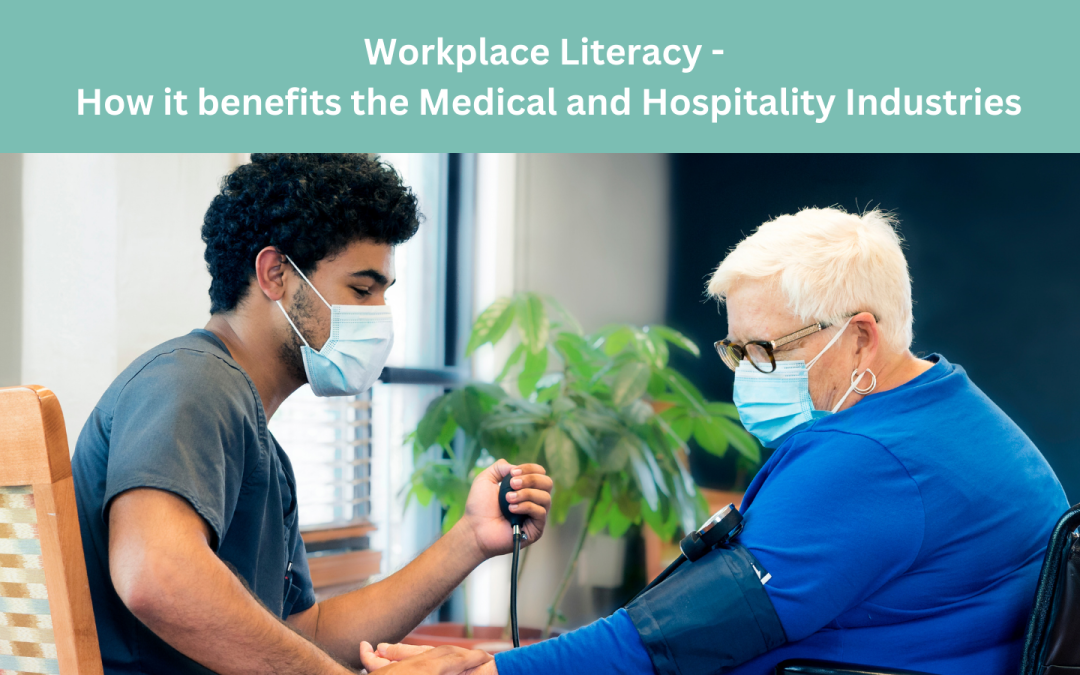Workplace Literacy: How it Benefits the Medical and Hospitality Industries
English is the language of business, so the ability to communicate effectively in English is an invaluable skill, especially in fields like medicine and hospitality where human interactions and precise communication are paramount. Non-native speakers who invest in literacy programs not only enhance their career prospects but also contribute significantly to the growth and development of these critical industries.
- Enhanced Patient Care in Medicine:
In the medical field, effective communication between healthcare professionals and patients can literally be the difference between life and death. Patients come from diverse backgrounds, and their ability to convey their symptoms, concerns, and medical histories accurately can impact diagnosis and treatment outcomes. Here’s how non-native speakers improving their English can benefit healthcare:
- Improved Doctor-Patient Communication: Non-native English-speaking healthcare providers who enhance their English language proficiency can communicate more clearly with patients, ensuring better understanding of medical conditions, treatment options, and instructions for post-treatment care.
- Reduced Risk of Misdiagnosis: Accurate communication minimizes the risk of misdiagnosis or misunderstanding patients’ needs, contributing to improved healthcare outcomes.
- Enhanced Cultural Sensitivity: Non-native speakers who invest in language improvement often develop a deeper understanding of cultural nuances, enabling them to provide more culturally sensitive care.
- Advancements in Medical Research:
Research and innovation are fundamental to progress in the medical field. English is the dominant language for scientific publications and conferences. Non-native speakers who master English can actively participate in global medical research, sharing their findings and contributing to advancements in healthcare.
- Access to Global Research: Proficiency in English grants non-native speakers access to a vast body of international research, allowing them to stay updated with the latest medical breakthroughs and apply this knowledge to their own work.
- Collaboration Opportunities: English proficiency facilitates collaboration with researchers and institutions worldwide, leading to collaborative studies, clinical trials, and joint research projects that benefit the entire medical community and ultimately the world.
- Elevating Service in Hospitality:
Guest satisfaction and hospitality go hand in hand. For workers in the hospitality industry, non-native English speakers who improve their English skills can provide a superior level of service to guests and enhance the overall guest experience.
- Improved Customer Service: English-proficient staff can interact with guests more effectively, addressing their inquiries, concerns, and requests promptly and accurately. This leads to higher levels of customer satisfaction, referrals, and repeat business.
- Expanded Career Opportunities: Enhanced English proficiency opens up a wider range of career opportunities in the hospitality industry, from front-of-house roles like concierge and guest services to managerial positions.
- Cultural Sensitivity: Learning English often involves exposure to different cultures and customs. Hospitality professionals who speak English well can better understand and cater to the needs of international guests, creating a more welcoming and inclusive environment.
- Reducing Job-Related Injuries and Malpractice Suits:
In both medicine and hospitality, safety is important. Improved English proficiency among non-native speakers contributes to a safer and more secure environment for patients and guests.
- Accurate Documentation: In healthcare, precise documentation is crucial for patient records and legal purposes. Proficient English skills ensure the healthcare professional can read and comprehend complex medical documents, prescriptions, safety protocols, and patient records.
- Emergency Situations: In both fields, the ability to convey critical information during emergencies is essential. Clear, effective communication can save lives and prevent accidents.
Although every industry benefits from multilingual employers, it can be argued that being multilingual in the medical and hospitality fields is the most impactful. Are you prepared for the responsibility, visibility, and liability a workplace literacy program may bring? Schedule a meeting with Manatee Literacy Council. You’ll learn about setting goals and measurable objectives for your employees and creating an adult literacy program that works for your organization.
Manatee Literacy provides workplace literacy classes for business, empowering employees through English. For a more information, please contact [email protected].


Recent Comments